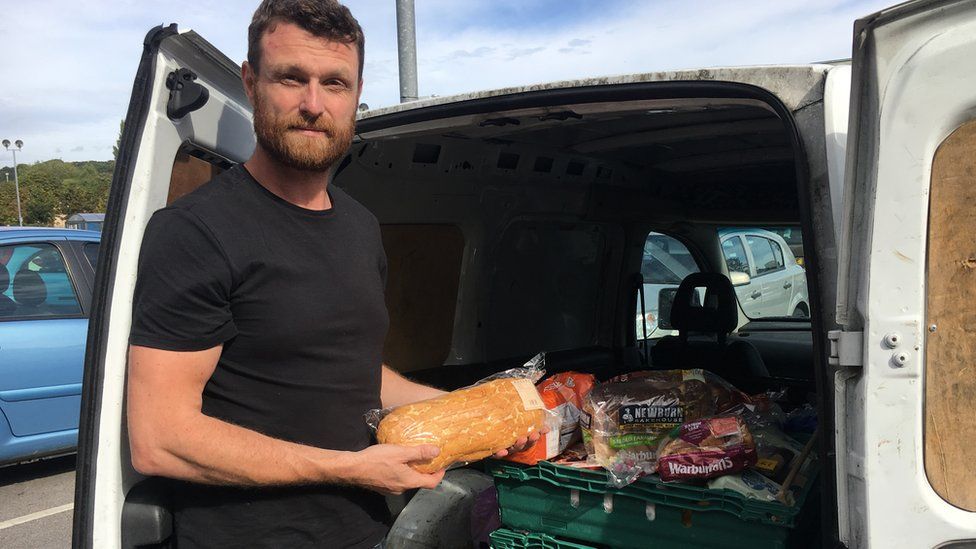Supermarkets 'use bread for marketing'
- Published

Phil Cash said he was collecting up to two tonnes of bread products a day, in Leeds
Supermarkets deliberately bake too much bread in-store as a marketing tool to attract shoppers, food waste charities claim.
It means tonnes of unsold items are being collected daily in UK cities by one - The Real Junk Food Project.
Supermarkets have rejected the claims, saying all stores have targets to reduce waste.
But one food expert said bread is used as a loss-leader in a bid to emphasise the value of higher-priced items.
Corin Bell, director of the Real Junk Food Project (RJFP) in Manchester, told BBC Radio 4's You and Yours that fresh products are used as marketing tools because they are seen as a "mark of quality and freshness".
'Quickly perishable'
"It's one of the things that consumers notice," she said. "There's lots of research out there that shows when bakery goods are still hot they move way faster and it's something that entices customers into a store."
However, the waste issue can arise because the items are "quickly perishable", said Ms Bell.
At the charity's outlet in Leeds, for example, warehouse manager Phil Cash said he collects up to two tonnes of bread products a day across the city - the largest volume from M&S and Sainsbury's - but has to spend up to £3,500 a year itself to dump perished items.
"Particularly with things like baguettes, they have a particularly short shelf-life so being able to re-distribute them, we just can't do it fast enough... some things still get wasted," he said.
The Real Junk Food Project in Leeds said it spends up to £3,500 a year dumping food that has perished
Mr Cash said one branch of M&S told him it had a food "wastage allowance" of 3% of its £1m weekly takings, although the company said it "did not recognise" the figures.
Joanna Blythman, food journalist and author of Bad Food Britain, said bread has been used as a loss leader for years.
"They are what's known as "value items"... to put a kind of halo around everything else that's on the shelf. So people will look at it and say, 'Ooh, cheap bread, that must mean it's a cheap chain', and it clearly isn't," she said.
'Food like decorations'
Tristram Stuart, founder of Feedback, a charity that combats global food waste, said the problem is at its biggest in supermarkets' supply chains.
"[They are] overstocking and using food like Christmas decorations as a marketing ploy - and putting in place trading agreements with their suppliers that force them to overproduce in order always to be able to meet the supermarkets' last minute changes in orders," he said.
But M&S said it had a policy to track and measure its waste in all stores.
"None of our stores have a waste allowance. We have an overall target to reduce food waste in our stores by 20% by 2020," a spokesman said.
"Whilst there will always be some unsold food we are committed to ensuring this gets put to the best possible use by continuing to grow our charity partnerships."
Sainsbury's said it works with more than 1,000 charities, including RJFP, to help redistribute its leftover food.
"With regards bread, this isn't a marketing tool but a staple item for the majority of our customers," a spokesman said.
"Our aim is to sell everything we make and we manage volumes in a number of ways to best achieve this."